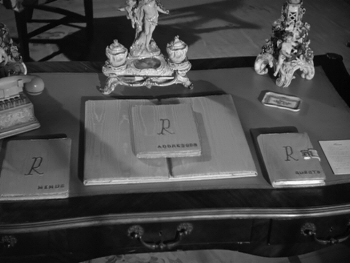
The late Rebecca de Winter never appears on screen, yet she still haunts it.
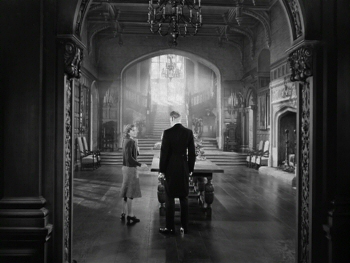
The glorious architecture of Manderlay captured beautifully by cinematographer George Barnes.
Review by Jay Wilson On the first viewing, throughout most of Rebecca’s running time, I found myself not sure quite what to make of Alfred Hitchcock’s first Hollywood movie. It contained elements I admired, to be sure—a wonderful frame, great deep focus photography, colorful and memorable side characters, and a remarkable attention to details. But Joan Fontaine’s overly timid mousy (not to mention nameless) character seemed to go way too long letting people step on her before growing a spine. Laurence Olivier’s overplayed Maxim de Winter’s dark side to the point that not only does he comes across as an over emotional prick who needs to grow a pair and let go of the past, but the Maxim character feels painfully contrived with his stubborn refusal to explain why insignificant nothings set him off. And for the longest time, I’ll be damned if I could figure out what these two saw in each other to get married. From frame one, there seems to be no hope of a happily ever after, and no amount of money is worth this misery. Throughout the first half of the movie after the awkward courtship, the new nameless second wife of Mr. De Winter moves in to his mansion, the estate known as Manderlay, where she quickly falls in the shadow of the late Rebecca de Winter. Rebecca, she was the most beautiful woman, who slept in the most beautiful room, which had the most beautiful view out its majestic windows. Like something out of a fairy tale. Rebecca, who threw the most wonderful parties, had the most wonderful friends, and was the epitome of perfection in every sense. Everyone loved Rebecca. No one spoke ill of her. Surely this explains why Mr. De Winter acts so hostile now whenever something should remind him of her. To lose a wife so beautiful, so charming, and so perfect? No. Somehow I didn’t buy it. It didn’t feel right. Back to Manderlay, everywhere our nameless protagonist turns, she’s haunted by the letter R marking Rebecca’s territory. On pillows, address books. The poor girl can’t even blow her nose on a handkerchief without seeing that ominous R hovering in front of her face. And every conversation with every servant, every guest, and everyone on this estate leads right back to the ever present Rebecca de Winter. 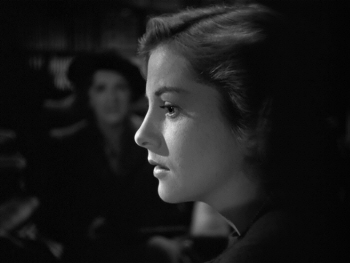
I love this shot of Joan Fontaine in profile with and Gladys Cooper out of focus in the background. The visual alone lets you know the conversation just took a dark turn.
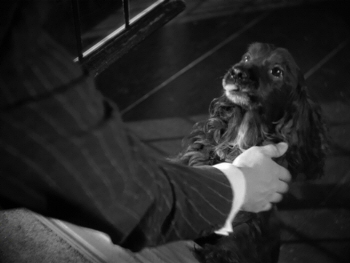
One of Hitchcock's charms is the attention he gives to every detail no matter how small such as this dog who really doesn't serve any purpose but adds to the movie none-the-less.
And to compound the issue, the head servant, Mrs. Danvers, show’s no warmth for the new Mrs. de Winter, who, in their first meeting, seems to size up her new mistress with her icy gaze, quietly deeming her unworthy to follow after Rebecca. Their early conversations play like a series of tests than discourse, which escalates until the eerie sequence where Mrs Danvers shows the new wife Rebecca’s old room, kept just the way she liked it. “That’s not right; you moved her brush. There.” She says moving the item a mere half an inch. The obsession continues, as Mrs. Danvers reminisces, “she used to sit here, and I would brush her hair for twenty minutes at a time” talking in the same tone an Egyptian servant may have spoke of their Queen in the days when royalty was regarded not as mortals, but as Gods. And as Mrs. Danvers open’s Rebecca’s closet and holds one of her mistress’s soft fur coats against her cheek with an almost euphoric sigh, one wonders exactly what kind of relationship these two women once shared. Then finally, the new wife had had enough. She demands Danvers get rid of all of Rebecca’s old things. “I am Mrs. De Winter now.” She states, unwittingly declaring war with the fiercely loyal servant who launches a crusade to undermine her and prove once and for all that this peasant girl could never stack up against her former mistress. She doesn’t deserve Mr. De Winter. And she doesn’t deserve a life here at Manderlay. And despite the vast potency of the Danvers/de Winter conflict, not to mention the flawless execution of their rivalry, the inexplicable attraction between Fontaine and Olivier’s character undermines it all. Why the devil would Fontaine put up with Olivier when he’s been nothing but a complete hyper-sensitive flake? Going off the rails on poor Fontaine, who, for a painfully long stretch of the film, goes out of her way to not ruffle any feathers? At one point she addresses cold Mrs. Danvers with an optimistic smile and warm offer, “I’d like for us to be friends” and tearfully pleads with her husband, “if it’ll make you happy, I’ll go away.” And the only thing her troubles earn her is heartache and heartbreak. If I can’t figure out why Fontaine and Olivier would stick together period, I certainly can’t imagine this wife putting up with her husband’s and Danvers’ crap. And then something remarkable happened. Well over an hour into the movie, in the cottage on the beach where Rebecca sometimes stayed, Joan Fontaine’s character confronts her husband, “I know you compare me to her every time we embrace. Every time we kiss. I know you loved her.” To which he snaps, “Loved her?! I hated her!” And like that, that elusive information appeared and magically linked everything together. Mr De Winter went on to explain that the Rebecca the world knew was a very different creature than the one he knew. She was a heartless manipulative and adulterous monster with the power to destroy the de Winter name, and at the same time she masqueraded as a saint beloved by all. She kept him a prisoner, locked in the misery of the Victorian-era social truths—divorce was unspeakable, divorcing Rebecca was unforgivable—and she flaunted her power over him. 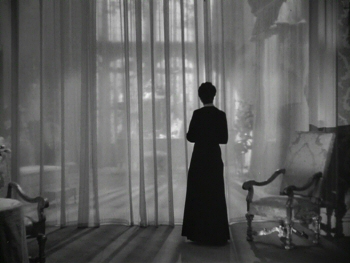
The black silhouette of Mrs. Danvers commands attention against the soft white backdrop of Rebecca's veiled room.
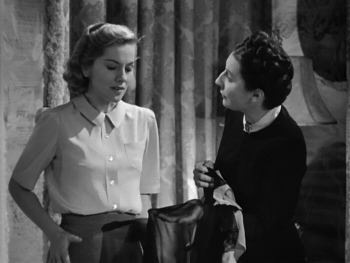
Judith Anderson (right) gives Rebecca a screen presence by proxy in a remarkable hypnotic performance.
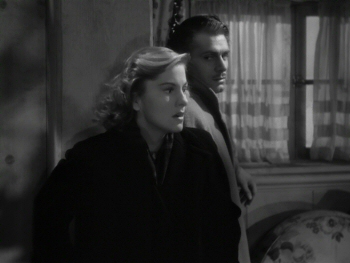
Using the pillar, Hitchcock is able to show both of these characters with their backs literally against the wall to metaphorically mirror their new predicament.
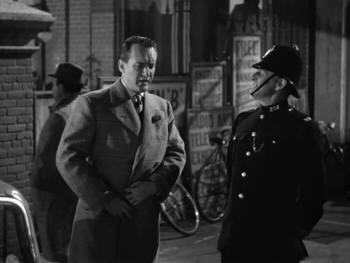
Don't blink or you'll miss the Hitchcock cameo in the final moments of the film.
Thank God she’s dead. ... but it isn’t over. The sunken boat Rebecca died on has been discovered, and with it revelations that could very well implicate Maxim de Winter of murder. Then at long last a bond forms between the husband and his new wife. A real bond. And for the first time, they felt like they belonged together, that they had something in common. They united, strangely enough, to defeat Rebecca whose venom extends beyond the grave to threaten their happiness. And they’ll spend the rest of the film working together to escape the far-reaching shadowy talons of Rebecca de Winter. And the revelation of the vixen’s true nature ripples back to the beginning of the film and provides the missing puzzle piece which helps it stand up, and upon a second viewing I realized and could appreciate the clever paradox at work (even if I still don’t fully buy into it.) Lonely lost girl, Joan Fontaine, gets swept up in a new life of riches, nobility, and status; she finds herself in an alien world in which she clearly does not fit in (but longs to.) And hearing so much about the great Rebecca whom everyone seemed to have adored, she naturally tries to mimic the late first wife, hoping to prove herself a worthy successor. While all along, Maxim wants her around precisely because she is not Rebecca and because she in no way reminds him of his first wife. Thus, the nameless protagonist’s efforts to fill her predecessor’s role only sets off Maxim, which prompts her to try even harder which will inevitably set him off again. Meanwhile, in a Victorian-esque atmosphere, Mr. de Winter can’t reveal the secrets of his late wife and her demise, for that could mean tainting the family name which, at one point in history, actually meant something. Her guilt plays into his guilt, and his into hers, creating a hopeless cycle of perpetual disappointment where two souls spiral down into despair. That is, until Maxim confesses, “I don’t deserve you,” and reveals the truth about Rebecca. I love the dark turn the nameless Fontaine character takes in that cottage, how instead of horror or repulsion she expresses relief—dare I say “a thrill”—at the chance to hate the former Mrs. De Winter, to tear down that perfect portrait to which she could never compare, to take metaphorical revenge on Rebecca by burying her once and for all and thwarting the wicked woman’s final scheme. By the end of the film, I still didn’t much care nor sympathize for Maxim de Winter even if I did understand him a little better, but I think the film works despite that because I had an enormous amount of sympathy for the unnamed protagonist who, really, was just minding her own business and trying to keep everyone around her happy when she got dragged into this dirty emotional tug-of-war. But I can settle for him getting a happy ending so long as she gets her’s ... ... even if he, by his own admission, doesn’t deserve it. | ||||||||||||||||||||
|
| ||||||||||||||||||||
